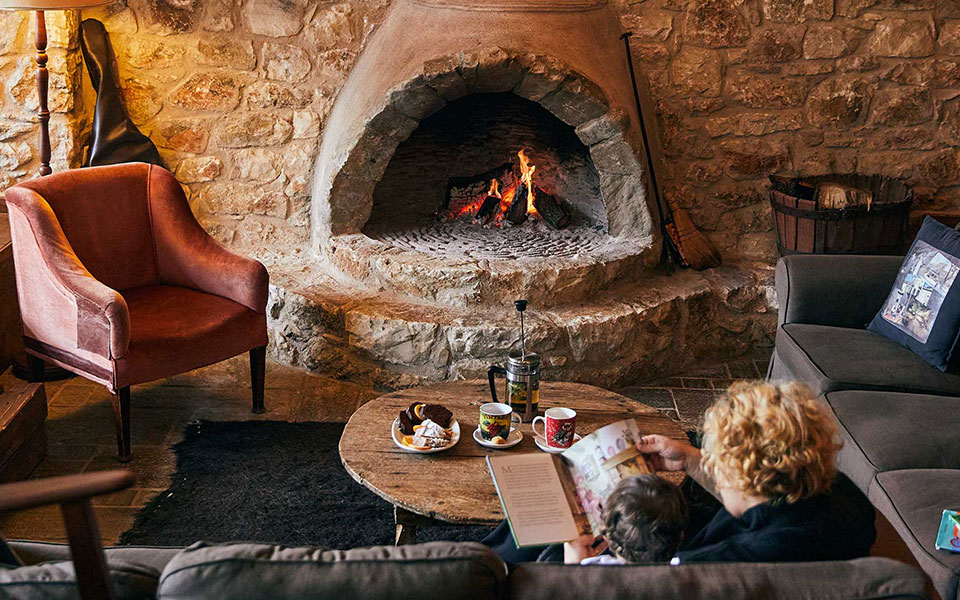Foresta in Medias Mores
Nestled in the central Peloponnesian village of Vlahokerasia, just a two-hour drive from Athens and only an hour from Kalamata, Nafplio or Gytheio, is the bucolic guesthouse Foresta in Medias Mores. The name, drawing inspiration from the Latin phrase “in medias res,” refers to a forest within the historical region of Morias and accurately conveys the sense that its visitors have of being at the heart of it all.
One year before the guesthouse opened, Tasos Mitsios, a renowned mountaineer, unveiled a stunning 14-km circular hiking trail around the village. This meticulously designed path weaves through diverse landscapes, skirting rivers and springs and passing old fountains and water mills, all surrounded by lush vegetation, including plane trees, chestnuts, cherries, and walnuts. The path starts at the banks of the Eurotas River and runs through the legendary Skiritida forest, once home to the elite Spartan warriors known as the “Skirites.” The forest, spanning 12,500 acres and dotted with chestnut and black pines, provides a magical backdrop for hiking and cycling adventures. Mountain bikes are available upon request from the guesthouse.
Info
Vlahokerasia, Arcadia Tel. (+30) 27111.040.99 forestahotel.com Double rooms from €90, breakfast included
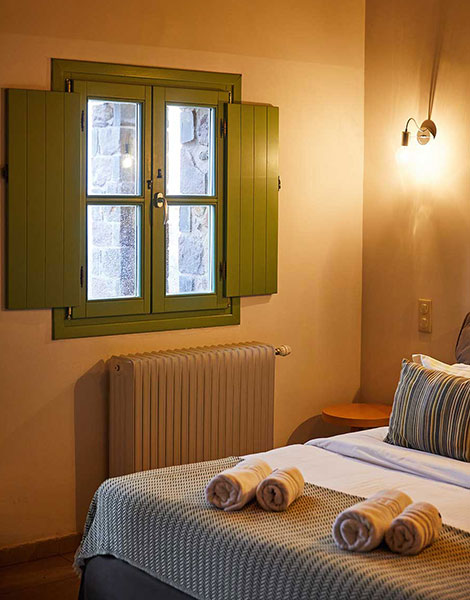
© Dimitris Vlaikos
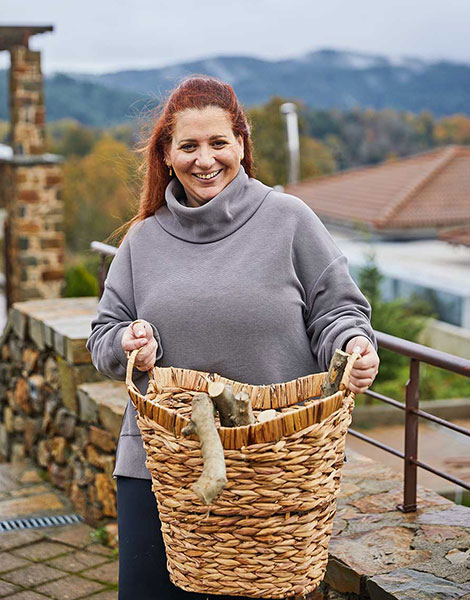
© Dimitris Vlaikos
The village of Vlahokerasia has emerged as a prime destination for hikers, maintaining its appeal even during the quieter winter period. The guesthouse itself radiates a summery vibe despite being equipped with fireplaces in each room. The decor is a mix of simplicity and elegance, featuring white and green hues, wood and stone accents, and vases filled with amaranths, and all the rooms offer breathtaking views.
In the summer months, there are plenty of activities, especially for children, including an adventure track and a mock Indian village. There are also yoga and Pilates sessions, and the courtyard is often packed with diners enjoying al fresco meals.
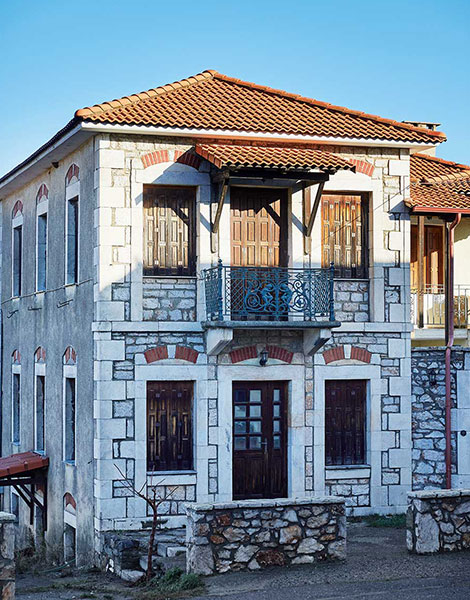
© Dimitris Vlaikos
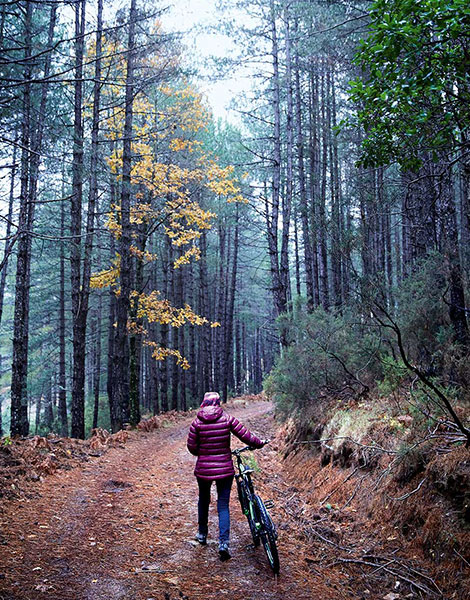
© Dimitris Vlaikos
Breakfast is served in the café with the fireplace and includes eggs from the establishment’s own hens, jams made by the owner of the guesthouse, local cheeses such as manouri and Tripoli graviera, and. depending on the season, apple pie, traditional milk pie, orange pie, and pies with fennel. Potatoes and other vegetables are from the garden.
The owner’s daughter Nadia prepares hearty lasagna (using local pasta); trahanas (fermented cracked wheat) with PDO Tripoli feta; boiled goat; kid goat on a spit; and savory pies. In winter, roasted chestnuts are served, too. Winter is also when you can participate in one of the activities organized by the social cooperative enterprise 5 Ente in Doliana Kynourias (30 minutes away); it collaborates with Foresta and operates in the wider area.
You can hike with them through winter scenery collecting mushrooms or chestnuts and then cook them outdoors or in the fireplace at Foresta, where you can also enjoy the local “tsoukalokauto,” made by boiling a local red wine together with sugar, cinnamon and other spices. It’s the ultimate winter warmer!
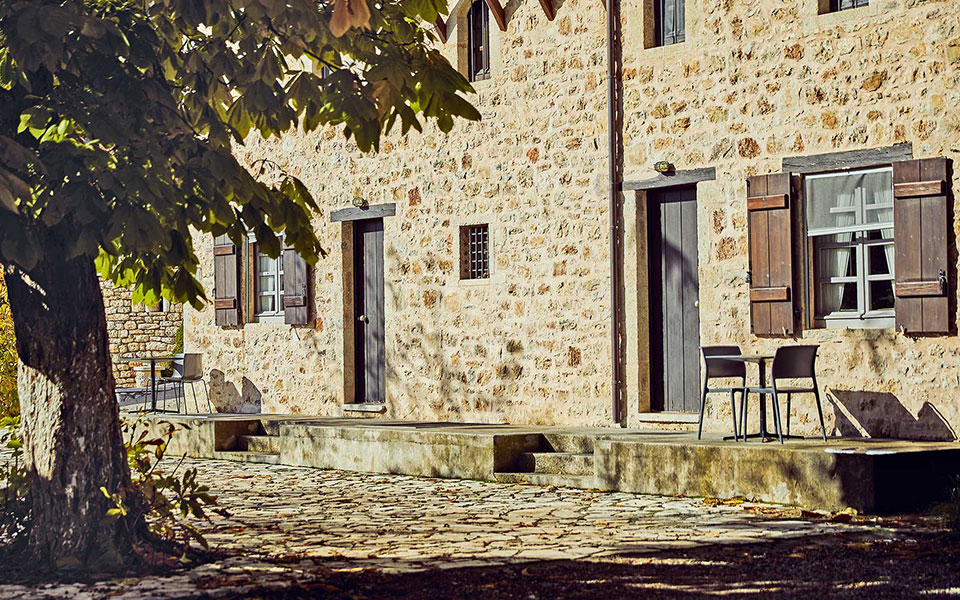
© Dimitris Vlaikos
Archontiko Anyfanti
The two-storey stone building took its current architectural shape in 1840, serving as the Anifantis family home. The family resided on the first floor, the ground floor housed a textile workshop and store, and the dyeing room was in the courtyard. Before that, the structure had been a single-level warehouse, used for storing nitre to supply the gunpowder mills of neighboring Dimitsana during Turkish rule.
The house was later bequeathed to the village by Dr. Panagiotis Liberopoulos from Zatouna, with the stipulation that it be transformed into a hotel. Its renovation, faithful to the original designs and under the guidance of architect Yannis Kizis, spanned from 2005 to 2016. That’s when Natassa Theochari and George Tsiouris entered the picture: “One weekend, while walking in the village, we noticed the construction work. Someone suggested we get involved, and without much deliberation, we decided we would. That’s typical of how we both make decisions.”
Their tasteful interventions have brought modern elegance to traditional charm. Natassa’s brother, Kostas Theocharis, a renowned artist and designer, contributed significantly to the decor, creating eight unique silkscreen pieces for the rooms and designing nine distinct place mats depicting village life in three colors: white, black, and gold. He also crafted the guesthouse logo, which features a handcrafted font inspired by Byzantine manuscripts.
Info
Zatouna Arcadia, Tel. (+30) 27950.292.02, archontikoanyfanti.com Double rooms from €100, breakfast included
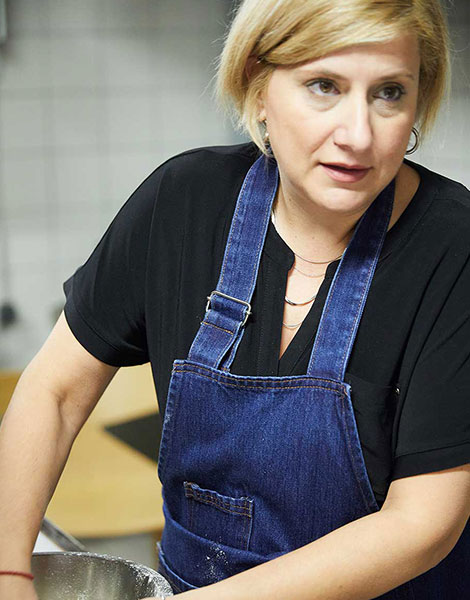
© Dimitris Vlaikos
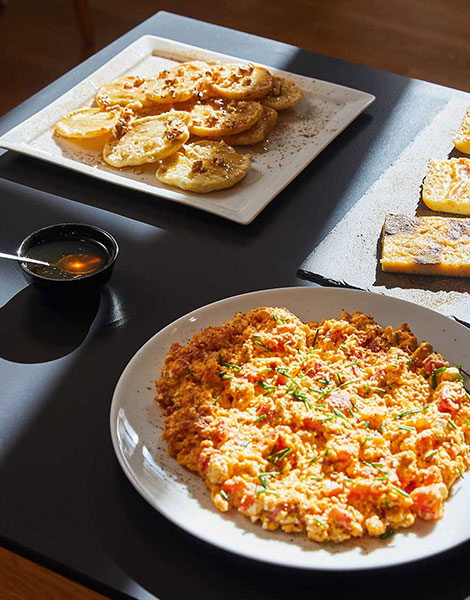
© Dimitris Vlaikos
The building boasts wooden ceilings painted in traditional Arcadian colors as well as large windows, cornerstones, and domes, all contributing to a grand atmosphere that reflects its long history. The guesthouse offers six spacious rooms, including two suites with balconies and one with a fireplace; they all have wooden floors, desks, TVs, and comfortable bedding. Additional amenities include room service, in-room breakfast, and computer access. The sitting area has a more modern feel, and activities include yoga and Pilates classes, cooking seminars, and organized picnics. The picnic baskets contain sandwiches with homemade bread and muffins from the guesthouse, freshly squeezed juice, and more. They’re perfect for an enjoyable meal by the river or in the area’s dense fir forests.
In general, top-quality food is a vital part of the philosophy of the guesthouse, reflecting its owners’ passion for hospitality. Theochari and Tsiouris, both avid food enthusiasts, delight in cooking, in refining their recipes, and in enhancing their culinary skills even as they draw on their families’ rich culinary traditions. They bring their expertise and passion to bear in the kitchen of the Archontiko Anyfantis restaurant, which offers private dining options and serves dishes epitomizing comfort food.
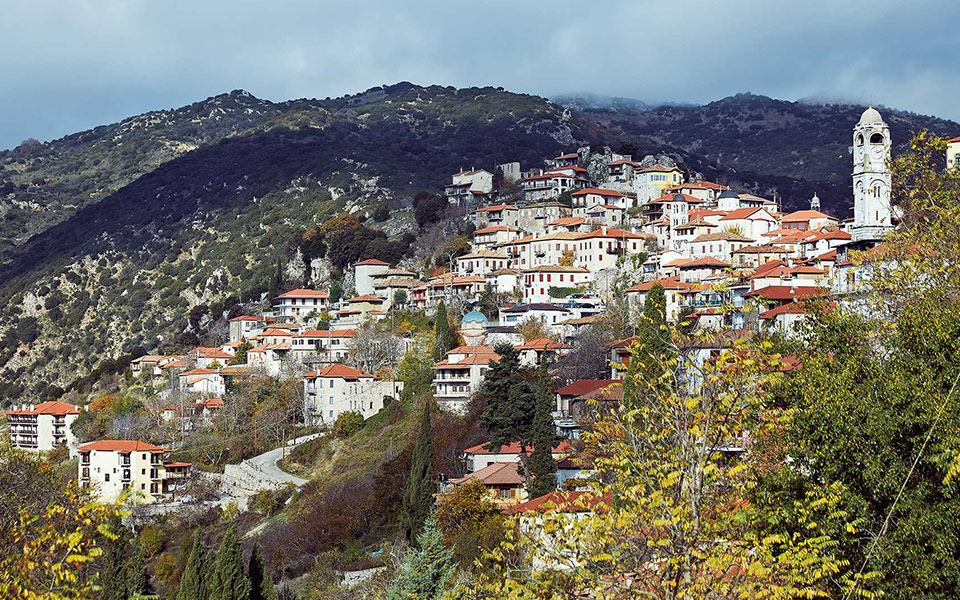
© Dimitris Vlaikos
Zatouna, located in a fertile region just four kilometers from the more cosmopolitan village of Dimitsana, offers a serene escape yet remains within easy reach of the other picturesque villages of Arcadia, and of the River Lousios with its monasteries and hiking trails. Despite its very small population (only 35 people live here), Zatouna itself is charming; it has streams and fountains, the Mikis Theodorakis Museum – commemorating the village’s connection to the late, great composer – and is located in a verdant area of great natural beauty.
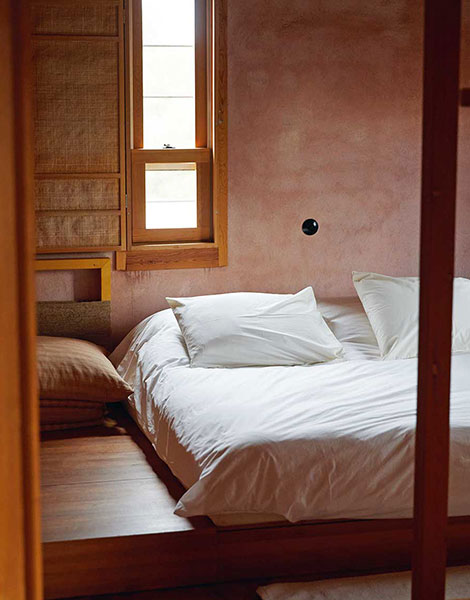
© Dimitris Vlaikos
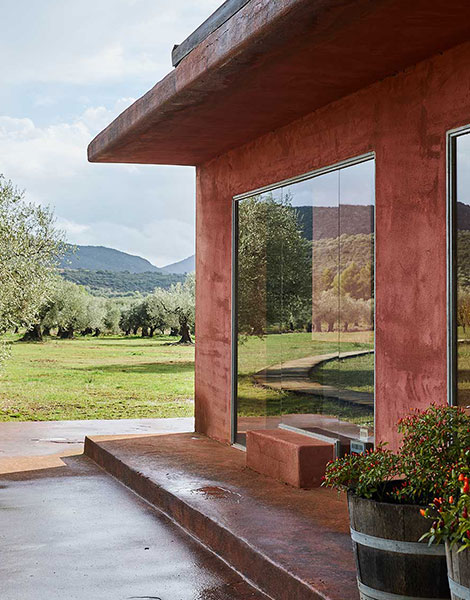
© Dimitris Vlaikos
Eumelia
“Eumelia,” which means “melody” in ancient Greek, reflects the deep love for music shared by owners Fragkiskos Karalis and Marilena Karademou. Other passions of theirs are reflected in the many books and magazines on Laconia, wine, olive oil, and slow travel to be found at the guesthouse. Conversations here often revolve around permaculture and its myriad aspects: natural and biodynamic farming, living in tune with nature, and proper nutrition.
Driven by an eagerness to learn and a desire for sharing and communication, Karalis and Karademou have embraced an alternative lifestyle they want to share with as many people as possible. This vision led to the creation of their agritourism guesthouse in the village of Gouves, just 12km from the town of Skala in Laconia. The guesthouse, accessible via a 2-km dirt road from the village, offers soothing seclusion in a rural setting.
Info
Gouves, Laconia, Tel. (+30)6947-151400, eumelia.com Open from 1st March. Bungalow for two people from €438 with half board, farm tour, agritourism activities and olive oil tasting
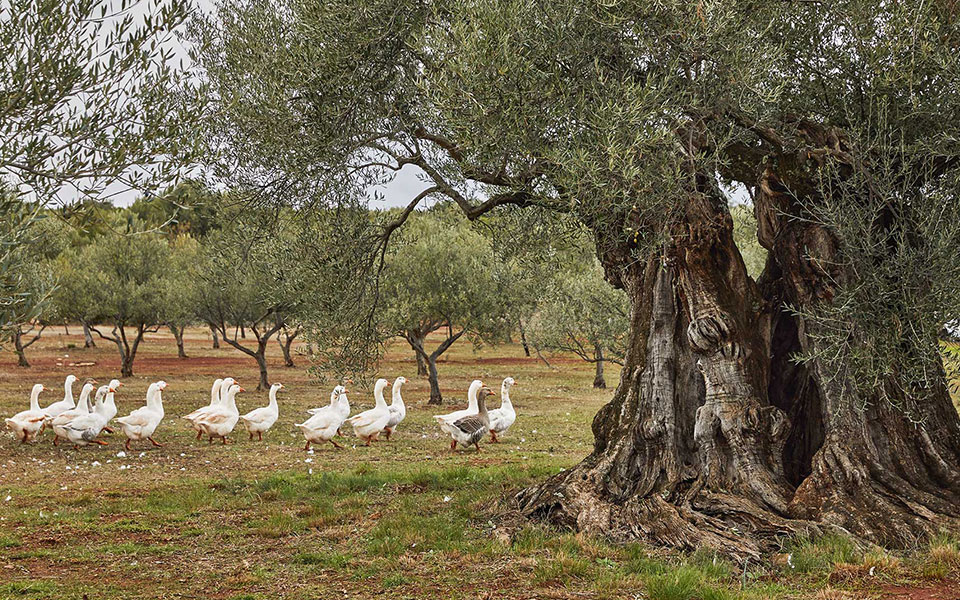
© Dimitris Vlaikos
The expansive farm that surrounds it includes an ancient olive grove and 35,000 sq.m. of land on which grapevines, almond trees, pine trees, and cypress grow, each contributing to the ecosystem. The construction elements used in the main building and the five individual guesthouses incorporate permaculture principles, emphasizing bioclimatic design to reduce energy consumption and environmental impact. The houses are largely energy-self-sufficient.
Another notable feature is the natural wastewater purification system using sand and reeds; the recycled water irrigates trees, while solid waste is composted for two years before serving as fertilizer.
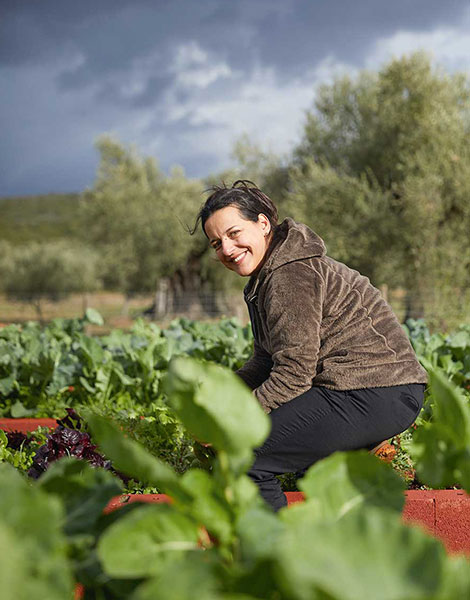
© Dimitris Vlaikos
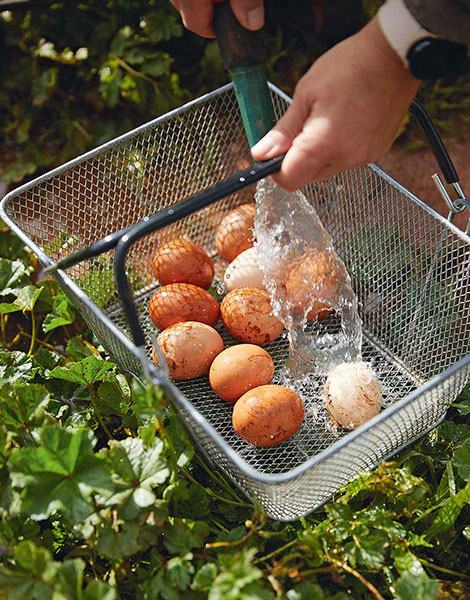
© Dimitris Vlaikos
The guesthouse’s wine list, curated by Karademou, features only natural wines made from Greek varieties. Their quality-certified olive oil stars in tastings led by Karalis, who explains the production process, the uniqueness of each variety, and proper tasting techniques. This olive oil also forms the basis of the handmade soaps Marilena crafts for guest use. She further showcases it in the creative dishes served in the main building; dinner is included with the accommodation, as is participation in agritourism activities. For the owners of this guesthouse, farm-to-table isn’t just a philosophy; it’s a way of life.
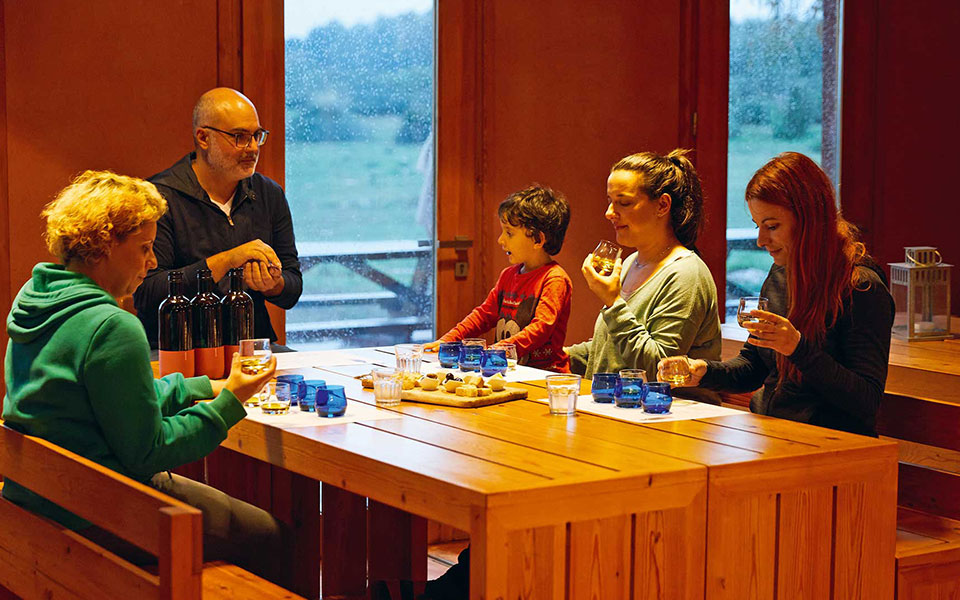
© Dimitris Vlaikos
The presence of livestock, combined with the estate’s open outdoor spaces (in which you’ll even find a swing) and an assortment of toys, makes Eumelia an ideal place for children.
Pets are also welcome, and get their own special bed and bowl in the room.
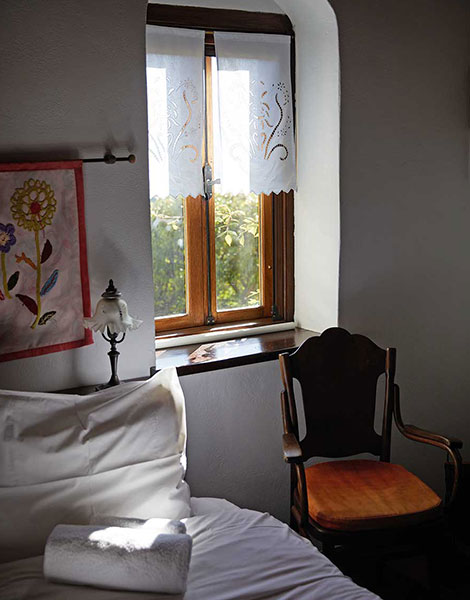
© Dimitris Vlaikos
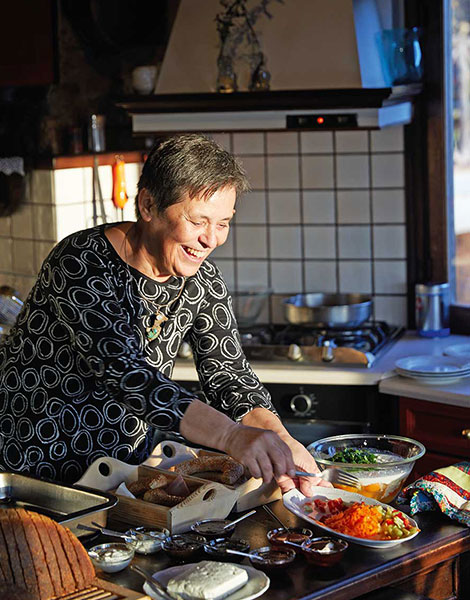
© Dimitris Vlaikos
Mpelleiko
Around 1650, a man named Bellas built a family home at an elevation of 1,170 meters overlooking the village of Stemnitsa. This house was passed down through generations, from Bellas to Bellas, until it was inherited by Nena Grintzia. In 2003, after spending fifteen years in Piraeus, Grintzia returned to Stemnitsa and transformed Mpelleiko into a guesthouse in order to preserve the building. By 2006, the guesthouse was ready to welcome its first guests. Initially, it operated from October 28 until Easter, catering largely to Greek visitors, but this has since changed.
For the past seventeen and a half years, the enthusiastic hostess has welcomed guests to her charming establishment, distinguished by its stunning glass window with mountain views, its warm fireplace, the homemade liqueurs, and a collection of board games. Grintzia is passionate about introducing visitors to the area, providing detailed guidance on destinations, and recommending local businesses she supports. In the summer, foreigners comprise 85% of the guests (the ratio is reversed in the winter), attracted by the opportunity to enjoy the relaxed mountain village lifestyle and to engage with local residents.
Info
Stemnitsa Arcadia, Tel. (+30) 27950.812.86, mpelleiko.gr Double rooms from €105, breakfast included
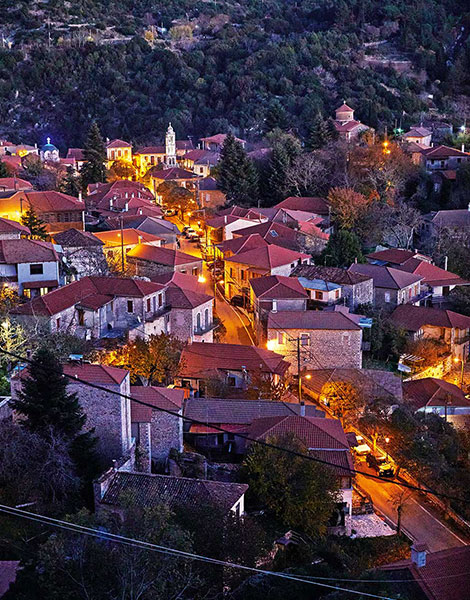
© Dimitris Vlaikos
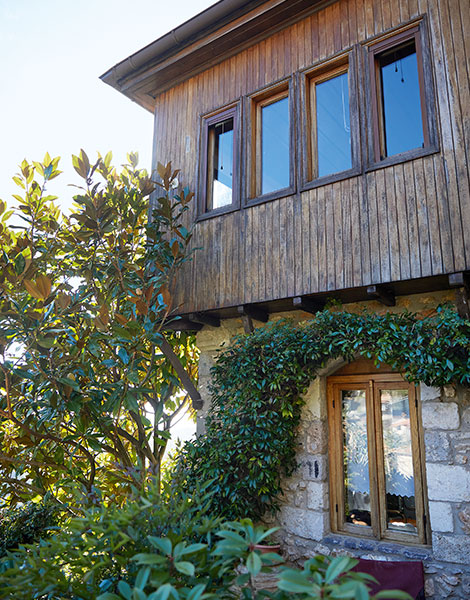
© Dimitris Vlaikos
Stemnitsa, a picturesque traditional settlement in Arcadia, is an ideal base for exploring the nearby villages of Dimitsana, Vytina and Lagadia, and the renowned monasteries of Lousios; it’s also a great base camp for hikers, as it’s the starting point of the Menalon Trail, a famous 75-km path that runs through Arcadia. Grintzia has pioneered the promotion and organization of the trail alongside a group of volunteers.
The guesthouse’s five rooms feature carpets woven by Grintzia’s grandmother Athanasia; colorful patchwork duvets and cushions crafted by her sister and her mother; hemstitch curtains; reproductions of paintings by folk artist Christos Kagaras; antiques; and newly made furniture that complements the house’s character. The mattresses and cushions are eco-friendly, and rooms have books, CD players, CDs, and handy amenities such as flashlights and earplugs.
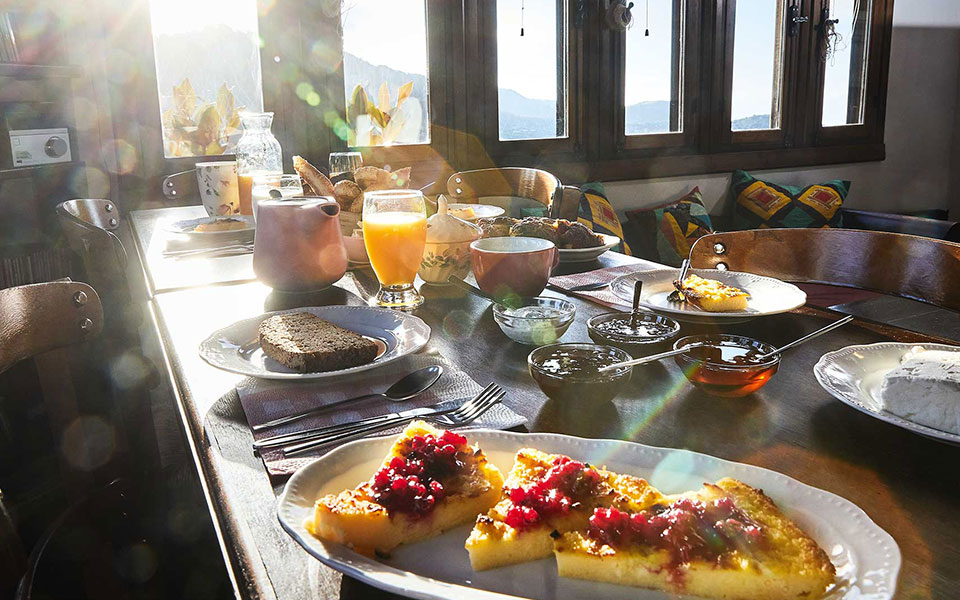
© Dimitris Vlaikos
Grintzia’s homemade breakfast includes eggs and yogurt (made from either sheep’s milk or goat’s milk) from a local organic farm, local cheeses, and pastries based on recipes that either her mother, her sister or she herself created. Vegetables from their garden, omelets, and savory pies with foraged ingredients they collect themselves, along with over fifteen types of jam made from fruit either picked by them or provided by friends from their organic gardens, are all on the menu.
This culinary experience extends to the “Gathering / Cooking with Nena” workshop hosted at the guesthouse, where the owner leads guests on nature walks so that they can forage, cook, and dine together.
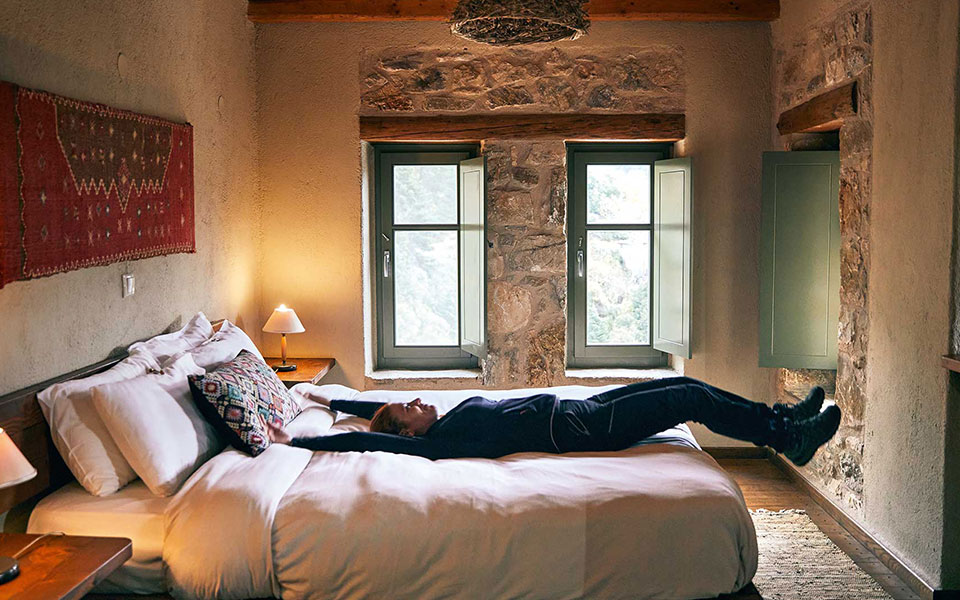
© Dimitris Vlaikos
Pritanio
Antonis Papanikolaou, who left Athens and his marketing and sales career behind 20 years ago, settled in the then-uninhabited village of Polydroso on the slopes of Mt Parnon. He leased the old school, built in 1892, transforming it into a guesthouse he named Scholarcheio. This enterprise, offering a blend of lodge and guesthouse hospitality, quickly earned a reputation as a cozy retreat for those seeking to connect with nature. Thanks to its friendly alternative atmosphere, it was fully booked every weekend. In 2011, when his lease ended and wasn’t renewed, Papanikolaou wasn’t ready to leave, so he established Pritanio.
Info
Polydroso, Laconia, Tel. (+30) 27310.26982, pritanio.gr From €90 with buffet breakfast, open on weekends only.
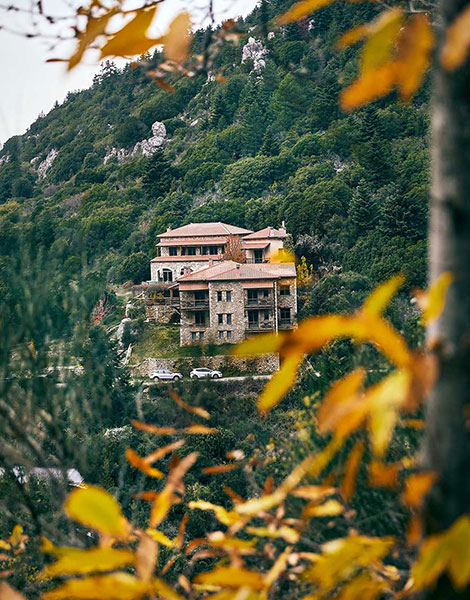
© Dimitris Vlaikos
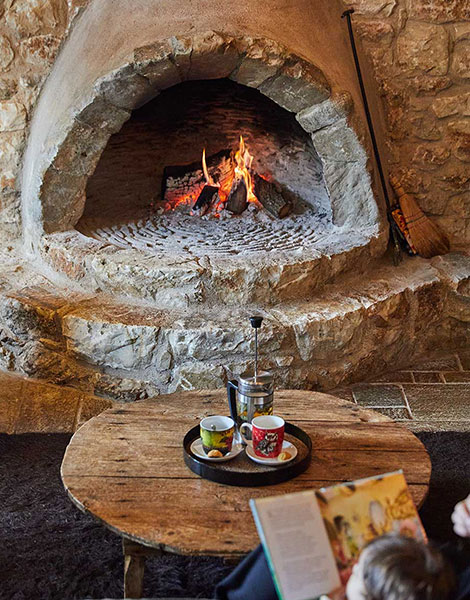
© Dimitris Vlaikos
Pritanio features eleven rooms spread across three stone buildings that encircle a well-kept courtyard. The rooms boast comfortable beds with soft bedding, large windows with forest views, fireplaces, and small living areas. They are decorated in earthy tones with vintage items (such as trunks, old sofas, and even shovels) that the owner collected from across Greece. This rustic charm complements the mountainous surroundings, adding warmth.
The communal hall with its unique fireplace is a cozy and unpretentious space, with breathtaking forest views through the glass door; a library; handmade wooden lamps; tilework; old objects; and paintings by Haris Liamis Yannakos. Papanikolaou believes the draw to Pritanio isn’t the guesthouse itself but the desire to connect with nature and experience genuine hospitality. He says, “Traveling here is therapeutic: tranquility, a serene forest, pristine water, and often no mobile phone signal. We’ve become overwhelmed by services and products. How much more can we consume?”
Despite that viewpoint, the breakfast buffet he offers is generous, and features homemade jams, cakes, trachanas, kagianas (a local version of scrambled eggs), savory pies, pancakes, loukoumades, and salads. You can even get four signature cocktails at the bar.
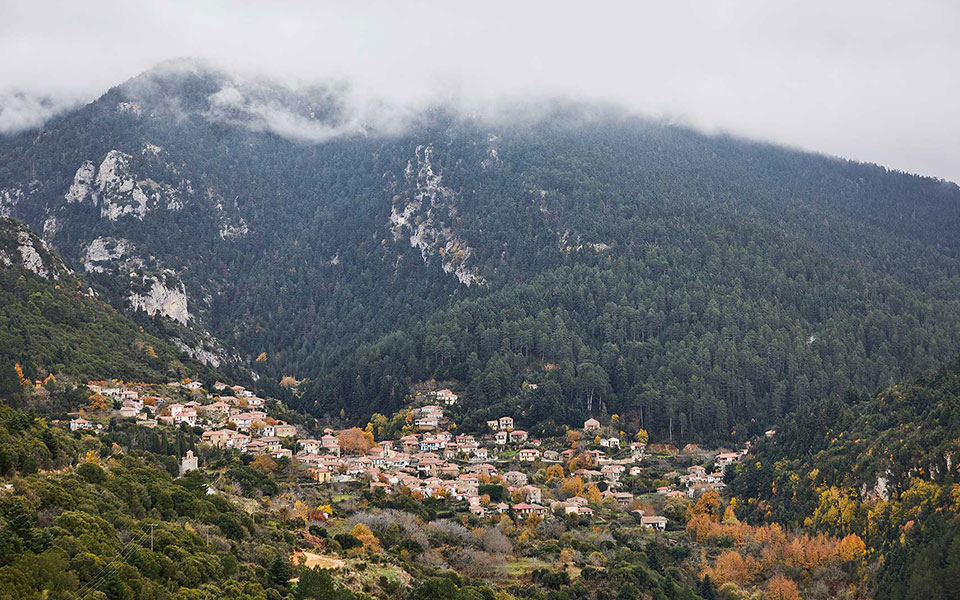
© Dimitris Vlaikos
With a welcoming staff and Papanikolaou’s personal touch, it’s tempting to hang around the establishment, but guests are encouraged to explore the area. Antonis guides large groups on off-road mountain adventures; Mt Parnon, still largely untouched by significant tourist development, boasts charming villages such as Kastanitsa, dense forests of fir, walnut, and chestnut trees, and a comprehensive network of trails, offering healthy exercise for the body and respite for the mind.
Polydroso, also known as Tzintzina, with its solitary taverna and café, serves as an ideal starting point for mountain hikes, with a network of nine marked trails ranging from gentle 40-minute walks to longer circular hikes. Popular routes include the path to the cave that houses the Church of Ai-Giannakis and the trail to the monastery of Agioi Anargyroi, with plenty of options for cyclists.

